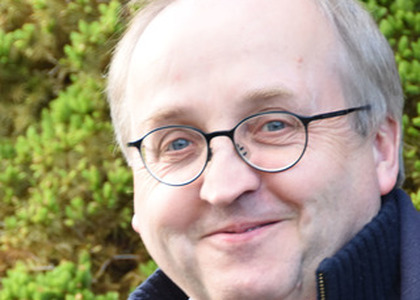> Interviews

Interview with the musicologist Michael Heinemann
As part of the International Week of New Music, a symposium on the points of compositional convergence between Romania and Germany will take place today, 26th of May 2023, at the New Europe College in Bucharest. Among the international guests is musicologist Michael Heinemann, professor at the Carl Maria von Weber Academy of Music in Dresden, from whom you can learn more in the following interview.
Mr Heinemann, is this your first time in Romania?
Yes, and I hope it is not the last time.
The conference you gave at the National University of Music in Bucharest, during the International Week of New Music, was centred around Heinrich Schütz and it was named New Music by an Old Composer. How do you explain this title?
Very often we look at Heinrich Schütz as an old composer who only composed old religious music. In photographs and paintings, he is presented as a very old man. Because he composed a lot of vocal music without any instrumental accompaniment, we tend to think his style is very old - like Palestrina's stile antico and so on. What I want to show - and what I've already shown in a book I wrote - is that this very old composer didn't just write in a very old style, but tried to integrate new ideas into this old method. He composed the sounds, he used them to render a kind of reality in which he was aware of the situation he wanted to compose.If we listen to the music of the Passions, at the moment when the crowd of people is calling for crucifixion, we notice that it is not necessarily beautiful music, but realistic music. This kind of realism is not explained by an old compositional practice, but by a new idea that makes Schütz, in my opinion, one of the first composers to compose sounds.
Heinrich Schütz and early music have been subjects that have preoccupied you a lot over the years. You are currently a professor at the Carl Maria von Weber Academy of Music in Dresden, where there is an archive dedicated to the composer. Why is the study of Schütz's music relevant today?
This is a very interesting question, because Schütz died more than 350 years ago. He is the most famous chamber music composer of the 17th century and is often considered the father of modern music. This requires some explanation. As well as being the first major German composer, we need to consider his music - what was new in his time and what we can learn from him, particularly about the German way of thinking - in what way you can draw a link between text and music. A connection that is not just a simple combination of words and music, but it is done in a dramatic, interesting way.
He is an original composer who tries to find new ideas to set text to music. We can study this in his music, which we can compare with the music of his generation, but also with the music of other centuries.
In the musicology symposium on May 26th, as part of the International Week of New Music, you will present the theme Fragility as an aesthetic premise in the work of Mark Andre. How does this theme fit into the symposium's theme of compositional convergence between Germany and Romania?
The first thing I can say is that Mark Andre is a French composer, but he has lived in Germany and loves living in Germany. He is half German, if we consider the national schools, but I don't like to do that, because the idea of a composer belonging to a certain nationality, in my opinion, belongs to an outdated way of thinking. In our times, what we could do is to think about the future interests and problems of composers, which are of interest to all composers from all geographical areas. The origins of composers, for me, is not so important. What is important is to solve in composition the problems of time, sound, rhythm, meter and so on - to have an earthly paradise of musical compositions, and I hope that my explanations and remarks about Mark Andre's music will suggest some ideas for us to think about in our Conservatories, to grow in a natural, natural way.
Translated by Delia Cocoș,
University of Bucharest, Faculty of Foreign Languages and Literatures, MTTLC, year II
Corrected by Silvia Petrescu














